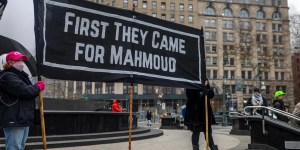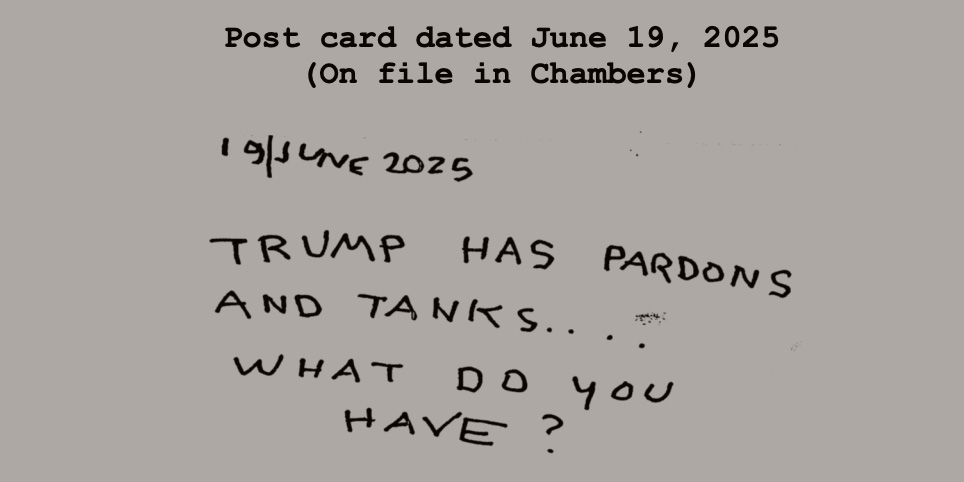In a landmark opinion, a federal judge ruled on Tuesday that the Trump administration unconstitutionally targeted noncitizens for pro-Palestine advocacy, in violation of the First Amendment and with the aim of suppressing critiques of Israel.
Judge William G. Young, a Reagan appointee to the federal court in Massachusetts, found that Secretary of State Marco Rubio and Secretary of Homeland Security Kristi Noem, along with their subordinates, “acted in concert to misuse the sweeping powers of their respective offices to target noncitizen pro-Palestinians for deportation primarily on account of their First Amendment protected political speech.”
“This is a new invention that in important ways goes beyond its closest analogues in the Red Scare,” Young wrote in his 161-page opinion, calling the case “perhaps the most important ever to fall within the jurisdiction of this district court.”
The American Association of University Professors, or AAUP, and the Middle East Studies Association filed a lawsuit against Rubio, Noem, and other Trump administration officials in March, following the arrests of Mahmoud Khalil and other campus activists.
AAUP alleged that these arrests were part of an “ideological deportation” policy, which was aimed at chilling speech on campuses nationwide.
“This is a new invention that in important ways goes beyond its closest analogues in the Red Scare.”
Young’s ruling was a significant departure from restrained judicial style. The judge even framed his opinion as a response to an anonymous, hand-scrawled postcard he received over the summer, an image of which is on the ruling’s cover page: “TRUMP HAS PARDONS AND TANKS… WHAT DO YOU HAVE?”
Young took issue with the federal government’s heavy reliance on the pro-Israel blacklist network Canary Mission in targeting advocates for Palestine, as officials from the State Department and U.S. Immigration and Customs Enforcement confirmed during a nine-day trial over the summer.
Agents used an “elastic” definition of antisemitism in their review, Young wrote, which included protected speech critiquing Israel’s war on Gaza.
In an “essentially frictionless” review process, Young wrote, ICE agents referred Khalil and others to the State Department, which quickly signed off on deporting them. Young found “virtually no evidence that anyone along the way seriously questioned whether pure political speech in support of Palestine or against Israel could be construed as support for terrorism.”

“This is a historic ruling that should have immediate implications for the Trump administration’s policies,” said Jameel Jaffer, executive director at the Knight First Amendment Institute, which represented the plaintiffs, in a press release. “If the First Amendment means anything, it means the government can’t imprison people simply because it disagrees with their political views. We welcome the court’s reaffirmation of this basic idea, which is foundational to our democracy.”
Young agreed with the plaintiffs that this review process and the high-profile arrests of campus activists amounted to an unconstitutional policy designed and executed “intentionally to chill the speech of other would be pro-Palestine and anti-Israel speakers.”
At one point, he called testimony from ICE’s acting director, Todd Lyons, about agents’ purported need to wear masks “disingenuous, squalid and dishonorable. ICE goes masked for a single reason — to terrorize Americans into quiescence.”
“To us, masks are associated with cowardly desperados and the despised Ku Klux Klan,” he wrote. “In all our history we have never tolerated an armed masked secret police.”
Young ordered subsequent hearings to decide what should be the appropriate remedy for these constitutional violations.
Addressing his ruling to “Mr. or Ms. Anonymous” from the postcard, Young closed with his fears for the path ahead for our democracy, and a question: “I fear President Trump believes the American people are so divided that today they will not stand up, fight for, and defend our most precious constitutional values so long as they are lulled into thinking their own personal interests are not affected.”
“Is he correct?” Young wondered.

